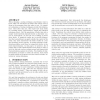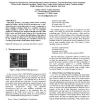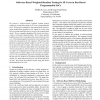43 search results - page 5 / 9 » On Applying Incremental Satisfiability to Delay Fault Testin... |
SOQUA
2007
13 years 6 months ago
2007
When choosing a testing technique, practitioners want to know which one will detect the faults that matter most to them in the programs that they plan to test. Do empirical evalua...
DATE
2004
IEEE
13 years 8 months ago
2004
IEEE
Noise affects circuit operation by increasing gate delays and causing latches to capture incorrect values. Noise analysis techniques can detect some of such noise faults, but accu...
ASPDAC
2006
ACM
13 years 11 months ago
2006
ACM
This paper presents a case-study of delay defect screening applied to Fujitsu 2.16GHz SPARC64 microprocessor. A nonrobust delay test is used while each test vector is compacted to...
VTS
2002
IEEE
13 years 9 months ago
2002
IEEE
We present a software-based weighted random pattern scheme for testing delay faults in IP cores of programmable SoCs. We describe a method for determining static and transition pr...
VLSID
2005
IEEE
13 years 10 months ago
2005
IEEE
During pseudorandom testing, a significant amount of energy and test application time is wasted for generating and for applying “useless” test vectors that do not contribute t...



